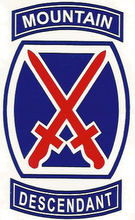From the book "In my father's foxholes and footsteps"
- From the book "In my father's foxholes and footsteps"
- The arrival in Italy and the transfer to the Apennines
- The attack on Mt Belvedere
- The defence of Mt Belvedere
- Il Malandrone, Cimon della Piella and Pietracolora
- The conquest of Castel d'Aiano and Mt della Spe
- The Spring Offensive
- Tolè towards Monte Pastore
- The conquest and crossing Savigno
- Fly down into the Po Valley
- Crossing the Po river
- The end of the war in Italy
- Return back to America and to the family
- All Pages
In any case we all suffered from insomnia. Sometimes, just thinking about the war itself could have killed you more so than the actual fighting. We all tried to find ways to get to sleep that night but it was of no use. The following morning we were expecting a German counterattack along the front line, towards the top and along the ridges of Mt. Belvedere. Our defense was held by machine guns, mortars, and well-supplied soldiers.
That night, February 20, Colonel David Fowler, the commander of the 87th Regiment gave orders to make sure that everything was all right or “buttoned up” as in his words. We needed to be ready for a counterattack the following day. The Major of our Battalion gave the orders to check everything throughout the 3rd Battalion. Previously, orders were give to kill and shoot everything that moved. So he was shot and killed by our own troops. A Major, yeah.
 At Corona, I set up the mortar in a fairly large foxhole. We also had enough room for the gunner, Fred Palmer who was from Maine. I loaded the shell and he would aim the gun. He awaited his orders, via telephone, from the Sergeant who would be stationed just a few yards ahead overseeing the action. The Sergeant would communicate to Fred the distance and then we would fire a round to see where it would hit. The Sergeant would then tell us if it was too far out or too short, too left or too right. If the fire was too short you’d end up killing your own men. We wanted to secure the surrounding grounds that were not visible from our machine gun fire. Fred regulated the mortar and then we would fire another round to see where it would hit. If it was okay we would “Let go”. We tried to find a good position for the mortar from the start so we wouldn’t have to move it too far back or too far sideways. The mortar is really a simple gun. All it is really, is a tube with a pin on the bottom, you put the mortar shell in and it comes out popping.
At Corona, I set up the mortar in a fairly large foxhole. We also had enough room for the gunner, Fred Palmer who was from Maine. I loaded the shell and he would aim the gun. He awaited his orders, via telephone, from the Sergeant who would be stationed just a few yards ahead overseeing the action. The Sergeant would communicate to Fred the distance and then we would fire a round to see where it would hit. The Sergeant would then tell us if it was too far out or too short, too left or too right. If the fire was too short you’d end up killing your own men. We wanted to secure the surrounding grounds that were not visible from our machine gun fire. Fred regulated the mortar and then we would fire another round to see where it would hit. If it was okay we would “Let go”. We tried to find a good position for the mortar from the start so we wouldn’t have to move it too far back or too far sideways. The mortar is really a simple gun. All it is really, is a tube with a pin on the bottom, you put the mortar shell in and it comes out popping.
Now I will tell you how I felt during my first Germans counterattack. I was brought up to respect life. But once enrolled in the service and was given a rifle with a bayonet, I had made up my mind to do my best to defend myself. I said to myself “either him or me”. That’s the way I felt. So, I didn’t have any scruples at anytime. Killing someone in cold blood is one thing, but when you find yourself in combat it’s a different story. You are there to do your duty. Whether you’re afraid or not, you do it. The moment prior to the attack is difficult to face because you begin to start thinking “ if you’ll make it or not”. Once you’re in it you just go ahead do your duty and forget about it. You do your job as a soldier while at the same time defending yourself if you have to. I think all soldiers feel that way. I don’t think any of them do it out of hatred but out of duty. I placed all of those thought in the back of my mind, I didn’t even think about it. I guess each one of us react differently but that’s how I felt.
The German counterattacks didn’t last very long. Sometimes an entire company would come or a company with about twenty men while at other times a squad of nine. The poor Germans didn’t have a chance. I’m telling you, sometimes when I look back, they really didn’t have a chance with all of us firing away. But it was the same for us when we were going in. Our morale was high, while, I think, the Germans’ was low. Despite it they did their job. Their equipment was magnificent. Sometimes I think they had better equipment than us. The Germans were extremely motivated and that’s why they were dangerous, very dangerous. So you just shoot at each other hoping for the best; some Germans got killed, some wounded.
Sometimes, when a German counterattack was over, we would go out there and look. It was heard from other companies, I’ve never seen it, that the Germans would put up a Red Cross flag and collected their fallen comrades, other times they would just stay let them stay out there to rot. But that’s the way it was. You have to control your feelings. We saw them and we would say, “Well, it was just his time”. Sure I felt sorry, but that’s all you can do. Almost certainly if we were to find ourselves in the same situation we would do the same. That’s what war is. Some of the rifle squads had some really bad experiences with Germans. The Germans would pretend to give themselves up, hands up and all, and then all of sudden, those in the front would throw themselves on the ground then those immediately behind, who held hidden machine guns, would open fire on our soldiers who were simply taking them prisoners. I think this happened more than once to different companies in our outfit. After that, they no longer wanted to take prisoners. Some men get very hard-boiled. Probably I think because they no longer have any conscience. They just killed, even when the others were surrendering. I read similar stories of Vietnam and now I can understand why. In the heat of battle you can’t think very well.
After three or four days in foxholes and after the German counterattacks ceased, the Brazilian Expedition Force (BEF) along with part of the 92nd Division, which was the black division, took over Corona. Some parts of our Battalion stayed on while other Battalions went back to Vidiciatico or Lizzano in Belvedere to rest up. I was at Vidiciatico to rest up and, you know, get clean. Once the line stabilized the fighting ceased. Of course there were always artillery shells coming over but it wasn’t as intense. We were given a rest. The entire division didn’t rest at the same time. It was only one regiment at a time. One regiment at a time would be taken out from the line and given a pass to either of the two rest areas nearby Montecatini or Lucca, from there we could go visit Pisa or Florence.
Val: “What did you do between the first and second offensive?”
There wasn’t too much time between the first and second offensives. It was only about a week. After taking Mt. Belvedere, we would go back to camp, get some rest and get ready for the second offensive, which was to begin in March. I asked myself why didn’t go ahead. We had broken through the German lines and were given them time to set up their defensive lines. I guess that’s the way it works in the Army. The likely reason for this was so that we could prepare for the spring offensive, which took place in April.








